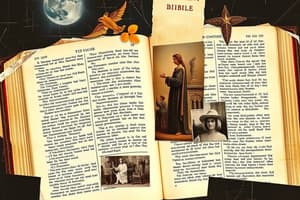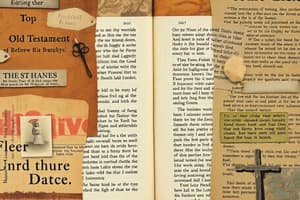Podcast
Questions and Answers
What are the three main parts of the Hebrew Bible?
What are the three main parts of the Hebrew Bible?
- The Gospels, The Acts, The Revelations
- The Torah, The Prophets, The Writings (correct)
- The Law, The Gospels, The Epistles
- The Pentateuch, The Letters, The Proverbs
Which of the following sections of the New Testament contains accounts of Jesus' life?
Which of the following sections of the New Testament contains accounts of Jesus' life?
- The Gospels (correct)
- The Book of Revelation
- The Epistles
- The Acts of the Apostles
What is a key theme in the Bible that emphasizes an agreement between God and humanity?
What is a key theme in the Bible that emphasizes an agreement between God and humanity?
- Justice
- Covenant (correct)
- Hope
- Salvation
Which literary genre in the Bible is primarily used to communicate moral and spiritual lessons through stories?
Which literary genre in the Bible is primarily used to communicate moral and spiritual lessons through stories?
Who is considered the father of the Israelites?
Who is considered the father of the Israelites?
Which book in the New Testament is known for detailing the early history and spread of Christianity?
Which book in the New Testament is known for detailing the early history and spread of Christianity?
Which part of the Hebrew Bible contains the first five books?
Which part of the Hebrew Bible contains the first five books?
What significant event is Moses known for in the biblical narrative?
What significant event is Moses known for in the biblical narrative?
Which of the following themes is central to the Christian faith regarding humanity's redemption?
Which of the following themes is central to the Christian faith regarding humanity's redemption?
Which figure is central to the Christian faith and is believed to be the Son of God?
Which figure is central to the Christian faith and is believed to be the Son of God?
What is the primary focus of the New Testament?
What is the primary focus of the New Testament?
What is a key factor in understanding biblical texts?
What is a key factor in understanding biblical texts?
What aspect do various denominations and scholars differ on regarding biblical texts?
What aspect do various denominations and scholars differ on regarding biblical texts?
Flashcards
Hebrew Bible
Hebrew Bible
The first part of the Bible, also called the Old Testament, focusing on Israelites' history, laws, and prophecies.
New Testament
New Testament
Part of the Bible that focuses on Jesus, his teachings, death and resurrection, and early Christianity.
Torah
Torah
First five books of the Hebrew Bible (Genesis, Exodus, Leviticus, Numbers, Deuteronomy). Describes creation, early humans, and God's covenant.
Gospels
Gospels
Signup and view all the flashcards
Prophecies
Prophecies
Signup and view all the flashcards
Covenant
Covenant
Signup and view all the flashcards
Salvation
Salvation
Signup and view all the flashcards
Literary Genres
Literary Genres
Signup and view all the flashcards
Abraham's role
Abraham's role
Signup and view all the flashcards
Moses's Key Event
Moses's Key Event
Signup and view all the flashcards
Jesus Christ's role
Jesus Christ's role
Signup and view all the flashcards
Bible's Historical Roots
Bible's Historical Roots
Signup and view all the flashcards
Different Bible Interpretations
Different Bible Interpretations
Signup and view all the flashcards
Study Notes
Overview of the Bible
- The Bible is a collection of religious texts, considered sacred by Christians, and by some Jews.
- It's comprised of two primary sections: the Hebrew Bible (also known as the Old Testament) and the New Testament.
- Different denominations of Christianity may have varied interpretations of some passages.
Hebrew Bible (Old Testament)
- This section primarily focuses on the history, laws, and prophecies of the Israelites.
- It's further divided into three main parts:
- The Torah (Pentateuch): the first five books (Genesis, Exodus, Leviticus, Numbers, Deuteronomy), broadly describing creation, the early history of humanity, and the covenant between God and Abraham.
- The Prophets: a collection of books containing prophecies and historical narratives about Israelite leaders and the rise and fall of kingdoms.
- The Writings: books that span various genres, including poetry, wisdom literature, and historical accounts.
The New Testament
- This section focuses on the teachings, life, death, and resurrection of Jesus Christ, and the early Christian Church.
- It's divided into:
- The Gospels: accounts of the life, ministry, death, and resurrection of Jesus.
- The Acts of the Apostles: details the early history and spread of Christianity.
- The Epistles (Letters): letters written by apostles and other leaders to congregations addressing various theological and practical issues.
- The Book of Revelation: a book of prophecy often interpreted as describing events leading to the end of the world.
Key Themes
- Covenant: A recurring theme of agreement between God and humanity, particularly with the Israelites.
- Law: Provides guidelines for living morally and religiously.
- Prophecy: Foretelling the future or communicating God's messages.
- Salvation: Central to the Christian faith, describing humanity's redemption through Jesus Christ.
- Hope: A theme expressing trust in the divine and a promise of future salvation.
- Justice: A recurring value concerning ethical conduct and societal order.
Literary Genres
- Historical accounts recount significant events.
- Poetry provides a form of religious expression and emotional depth.
- Laws outline societal and religious codes.
- Parables use stories to convey moral and spiritual lessons.
- Prophecies foretell future occurrences and divine messages.
- Epistles provide letters of instruction and encouragement.
Major Religious Figures
- Abraham: A patriarch in the Hebrew Bible, seen as the father of the Israelites.
- Moses: A key figure in the exodus from Egypt and the receiving of the Ten Commandments.
- Jesus Christ: Central figure in the Christian faith, believed to be the Son of God.
- Apostle Paul: A pivotal figure in spreading Christianity throughout the Roman Empire.
Historical Context
- The Bible's texts reflect the historical contexts of the ancient Near East, including the kingdoms of Israel and Judah.
- Understanding the cultural and historical setting can enhance interpretations of the biblical events.
- The Bible was compiled and revised over centuries and in cultures that varied.
Different Interpretations
- Various denominations and scholars offer diverse perspectives and interpretations of biblical texts.
- Differences exist regarding the authorship, dates and cultural contexts.
Studying That Suits You
Use AI to generate personalized quizzes and flashcards to suit your learning preferences.




